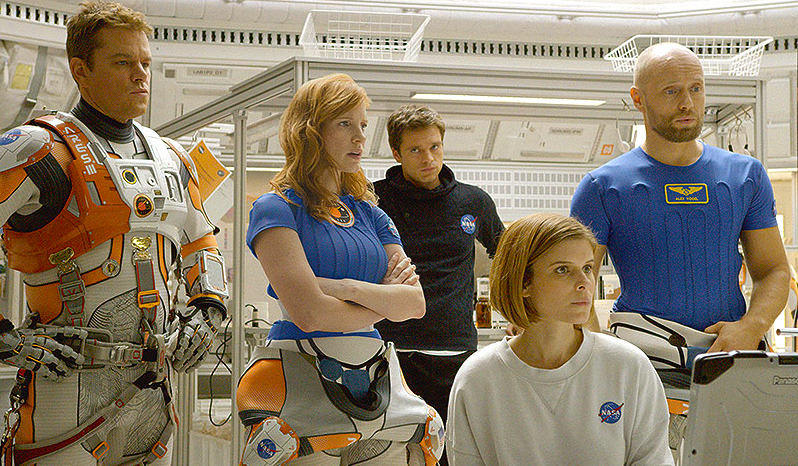This film is really tricky. On the surface it looks great: it stands out for having strong, visible female characters in positions of authority. In particular, Jessica Chastain’s character is the commander of the space ship Matt Damon is lost from. Depicting both female astronauts and female commanders is, alas, still something we need to celebrate. The film also offers smaller ‘yay’ moments, such as one of the closing shots sweeping around a classroom of trainee astronauts. At least half are women.
So far, so good.
Digesting the film over dinner, though, we started scratching the surface of those female characters. Apart from Chastain, the others are all in subordinate positions. All other major positions of authority are held by men. The heads of both the American and Chinese space programmes are male. The chief engineer is male. The head of astronauts in male. The president is male. (Okay, the president’s not really a character – he’s spoken to once on the phone – but how hard would it have been to say Madam President?)
Each space programme has one significant female in its team and both those women hold seemingly advisory positions. As NASA’s press secretary, Kristen Wiig provides the ongoing voice of reason about how everything will play out to the public. Is this to avoid the tricky implication that she might have to understand some science? Or is it so the men can make the heart-over-head, heroic decisions?
What particularly pissed me off, though, was the engineering team. There was not a single visible woman in the team building the probes and working out the technology to communicate with Damon. If I’m being cynical I’d say maybe that’s because you can put a woman in Lycra up in space, dress her in a snug fitted suit in a press room or formal meeting, but how can you make an overworked, unwashed, coffee-downing engineer look sexy?
Am I nitpicking? Is it ridiculous to complain that our other female astronaut, Kate Mara, had to be sexualised, given a love interest and finally shown babe in arms by the end of the film? Hey girls, follow your dreams, go to space, but don’t forget your clock is ticking, so make sure you find a husband while you’re up there and remember you won’t really be complete until you’re a mother.
For all my grumbles, this has scored fairly high on the test. Like Mad Max, I think, The Martian needs to be celebrated for being so, so much better that almost everything else out there. But we also need to ask, is this really the best we can do?













Recent Comments